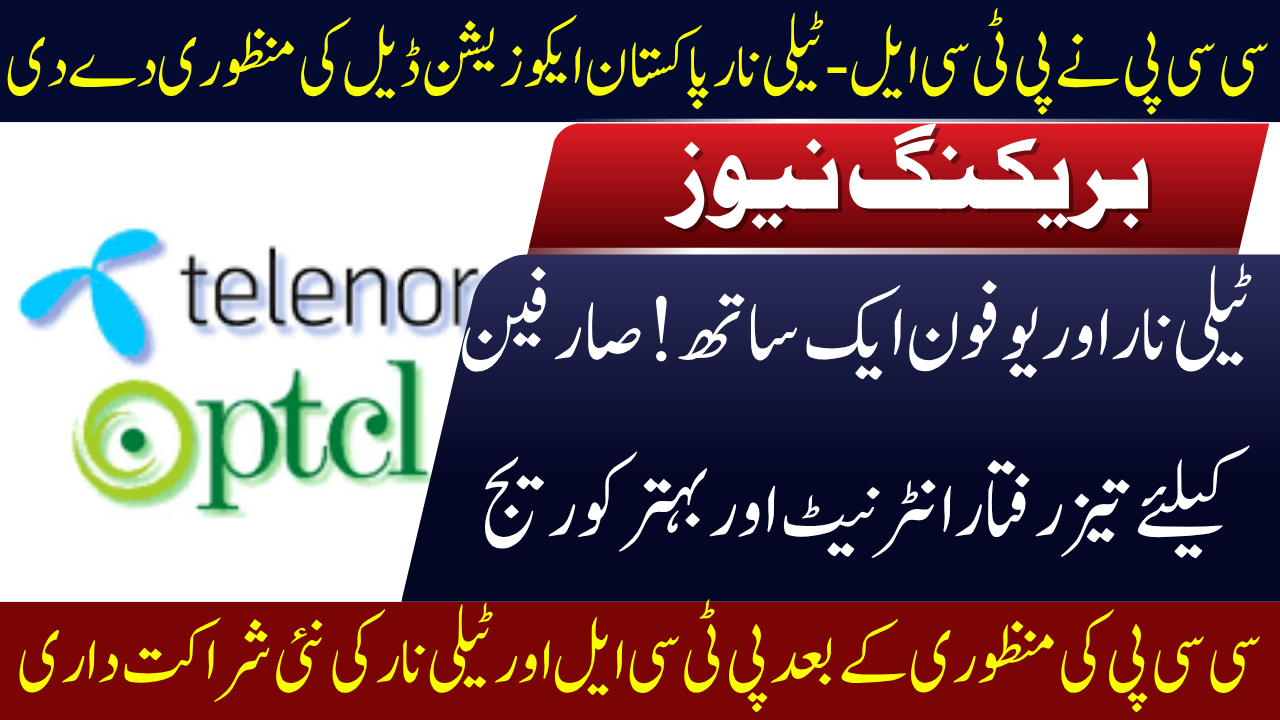PTCL-Telenor Pakistan
In a landmark development for Pakistan’s telecom industry, the Competition Commission of Pakistan (CCP) has officially approved the acquisition of Telenor Pakistan by Pakistan Telecommunication Company Limited (PTCL). The deal, considered one of the biggest in the country’s telecom sector, is expected to reshape the market, enhance digital connectivity, and bring new opportunities for consumers and businesses alike.
The Acquisition at a Glance
Under the agreement, PTCL Group, a subsidiary of e& (Etisalat Group), will acquire 100% of Telenor Pakistan’s operations. The approval from CCP clears the final regulatory hurdle, allowing PTCL to move forward with integrating Telenor’s infrastructure, customer base, and services into its operations.
Key Highlights:
- Acquirer: PTCL Group (part of Etisalat/e&)
- Target Company: Telenor Pakistan
- Regulatory Approval: Competition Commission of Pakistan (CCP)
- Deal Impact: Strengthening PTCL’s mobile services under Ufone brand
Why This Deal Matters
The telecom industry in Pakistan is facing challenges such as low average revenue per user (ARPU), rising infrastructure costs, and increasing demand for data services. This acquisition is expected to:
- Consolidate market players and reduce fragmentation.
- Strengthen PTCL’s Ufone network by adding Telenor’s subscribers and infrastructure.
- Improve customer experience through better coverage, 4G/5G readiness, and wider service offerings.
- Attract more foreign investment into Pakistan’s digital economy.
What CCP’s Approval Means
The Competition Commission reviewed the acquisition to ensure it does not create an unfair monopoly or negatively affect competition in the telecom market. After evaluation, CCP concluded that the merger would not harm consumer choice, as the sector still has multiple active operators, including Jazz and Zong.
This approval ensures compliance with Pakistan’s Competition Act 2010, while also paving the way for a more sustainable telecom ecosystem.
Impact on Consumers
For the nearly 45 million subscribers combined between Telenor Pakistan and Ufone, the deal could mean:
- Improved Network Coverage: Expansion of service areas, especially in rural and underserved regions.
- Better Internet Speeds: Integration of spectrum assets for stronger 4G and future 5G services.
- Expanded Services: Broader digital payment and fintech solutions.
- More Competitive Packages: Potential for attractive bundles and offers after consolidation.
Industry Reactions
Telecom analysts have welcomed the move, calling it a game-changer. They believe it will:
- Create a stronger competitor to Jazz and Zong.
- Drive efficiency by reducing duplication of infrastructure.
- Encourage network sharing and cost optimization in the sector.
A senior industry expert noted:
“The PTCL-Telenor deal will set the stage for the next phase of Pakistan’s digital transformation. It can bring in better services, wider reach, and more innovation for users.”
Quick Overview of the Deal
| Aspect | Details |
|---|---|
| Acquirer | PTCL Group (Etisalat/e&) |
| Target | Telenor Pakistan |
| Approval By | Competition Commission of Pakistan (CCP) |
| Combined Users | ~45 Million (Ufone + Telenor) |
| Sector Impact | Stronger competition, improved services |
Future Outlook
Following this approval, PTCL will begin the integration process, which may take several months. Industry watchers expect PTCL to:
- Expand 5G trials leveraging combined spectrum.
- Integrate Telenor Microfinance Bank (Easypaisa) with Ufone’s fintech solutions.
- Launch innovative digital and enterprise services to tap into Pakistan’s growing IT and telecom demand.
The deal could also encourage further consolidation in the telecom industry, making it more financially sustainable.
Conclusion
The CCP’s approval of PTCL’s acquisition of Telenor Pakistan marks a turning point for the country’s telecom sector. By bringing together two major players, the deal promises better services, stronger digital infrastructure, and increased investment in Pakistan’s rapidly expanding digital economy.
For consumers, this could mean faster internet, wider coverage, and more affordable packages, while for the industry, it signals the beginning of a new era of consolidation and growth.
